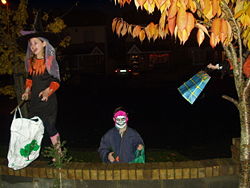Halloween: A Festival of Death

A Halloween scene in Dublin, Ireland.
In the latest issue of Tomorrow’s World magazine, LCG’s Rod McNair wrote:
Grotesque masks and costumes… terrifying images of movie monsters…sugar skulls and carved pumpkins…gravesite offerings for the dead. This year, millions of people around the world will observe Halloween,All Saints Day, All Souls Day and the Day of the Dead. Will you?
Most people today know that the modern Halloween festival has its roots in ancient traditions that pre-date Jesus Christ—yet they have no qualms about taking part in a day that draws heavily on morbid pre-Christian superstitions. Why is this? What should it mean to Christians today?
What did ancient Halloween celebrations involve? “The two chief characteristics of ancient Hallowe’en were the lighting of bonfires and the belief that of all nights in the year this is the one during which ghosts and witches are most likely to wander abroad… Further, it was a Druidic belief that on the eve of this festival Saman, lord of death, called together the wicked souls that within the past twelve months had been condemned to inhabit the bodies of animals” (“Halloween,” Encyclopaedia Britannica., 11th ed., vol. 12, pp. 857–8).
So how did professing Christians start following ancient Celtic practices? In 610ad, Pope Boniface IV established the Feast of All Holy Martyrs, held annually on May 13. In 835, Pope Gregory IV transferred the celebration to November 1, a date he designated as “All Saints Day” in honor of martyrs for their faith. What activities are associated with that day? Even today, in some Catholic countries, a popular folk tradition holds that people’s departed loved ones return to their former homes once a year, during this day, also known as the “Day of the Dead.” Mabuhay magazine described a colorful tradition of the Philippines, where families “troop to cemeteries to light candles and offer flowers… to departed relatives… on All Saints Day (November 1)” (“Halloween High Jinks,” November 1997, p. 34)…
“I don’t believe in all that mumbo-jumbo,” some might say. “I just like to have fun on a festival day.” Is there, in fact, anything wrong with the Halloween customs we see in modern-day America? Could there be any problem with costume parties, scary stories and the gathering of tasty treats? Should we disapprove of plastic battery-operated “goblins” glaring down at passing shoppers in a department store? After all, nobody today takes all the “scary” stuff seriously, right?
Perhaps that approach itself is part of the problem. The spirit world should be taken seriously. It is real, and it is dangerous to the unwary. Yet the dangers of the occult are often relegated to the status of a silly game, as if we could harmlessly play along if only we would “get into the spirit of it!” …
Interestingly, some historians have suggested a link between ancient “Day of the Dead” practices and the destruction of Noah’s idolatrous and licentious generation. Noah’s Flood began in the “second month, the seventeenth day of the month” (Genesis 7:11). One year later, in the second month, on the twenty-seventh day, Noah exited the ark (Genesis 8:14–16). If we count the timing of Noah’s Flood according to the Jewish civil calendar, the seventeenth day of the second month would be somewhere from late October to early November.
As author Frederick Filby has observed, “Thus the old world perished and a year later a new era commenced in the same month. Both of these facts are indelibly enshrined in the memory of the human race. To many people right round the world November brings the Day of the Dead. In a number of ancient and primitive calendars November also brings a New Year at a time which has neither solstice nor equinox nor astronomical event to justify it” (The Flood Reconsidered, pp. 106–107)…
May God grant you the understanding and discernment to come out of the world, wholly follow Him, and reject the festivitals of death!
The entire article is available on line and is titled Festivals of Death?
Yet, millions upon millions around the world will celebrate Halloween and not the biblical holy days.
Two articles of possibly related interest may include:
Is Halloween Holy Time for Christians? This article provides some historical and biblical insight on this question.
Is There “An Annual Worship Calendar” In the Bible? This paper provides a biblical and historical critique of several articles, including one by WCG which states that this should be a local decision. What do the Holy Days mean? Also you can click here for the calendar of Holy Days.
 |
Tweet |
|